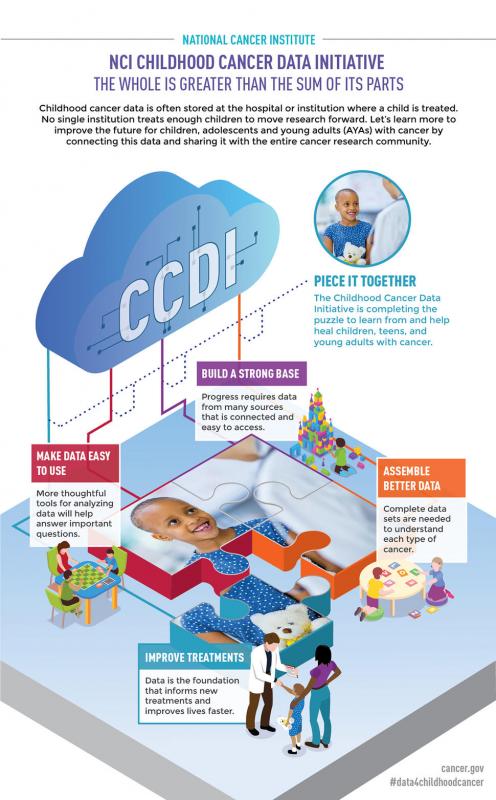News
CCDI: The Ecosystem Needed for Connecting Researchers to Childhood Cancer Data
On July 13th, 2020, NCI Director Dr. Ned Sharpless shared an update on the Childhood Cancer Data Initiative (CCDI), a $50 million federal investment made in 2020 with an additional $50 million proposed each year for the next 9 years. Led by NCI Office of Data Sharing Director, Dr. Jaime Guidry Auvil, CCDI aims to rapidly improve treatments for childhood and adolescent and young adult (AYA) cancers by expanding the breadth and quality of data accessible to researchers. Given the rarity of cancers in children and AYAs, there are many research challenges; leveraging data science and engineering will make cancer data much easier to access and use for cancer prevention, diagnoses, and treatment.
Since the initiative’s launch in July 2019, NCI has started to lay the foundation for developing and supporting CCDI with new activities and ongoing pediatric/AYA efforts producing large amounts of data such as TARGET (Therapeutically Applicable Research to Generate Effective Treatments) and Pediatric MATCH (Molecular Analysis for Therapy Choice).
“At the core of this initiative are our efforts to optimize this research infrastructure by creating a data ‘ecosystem,’” Dr. Sharpless explained in his blog. “This ecosystem will seamlessly connect the repositories and registries where these data are stored, allowing scientists to learn from the information gathered from each child and AYA with cancer without having to seek it from multiple institutions or researchers.” The federated ecosystem will connect a wide variety of data repositories (e.g., molecular, preclinical, biological, imaging, clinical trial data) and leverage patient registries represented through a National Childhood Cancer Registry.
On June 15, 2020, an ad hoc NCI working group convened to provide general guidance regarding future priorities for the initiative, including a report of 24 specific recommendations. Continuing to leverage data science and data sharing will be key to supporting the CCDI and helping it become a model for improving data for adult cancer as well as children. As Dr. Guidry Auvil shared, “Our goal in optimizing how we collect, use, and share data is to truly learn all we can from every child so that every child can maximally benefit from what we learn.”
Learn more about the CCDI and its current status on cancer.gov.

